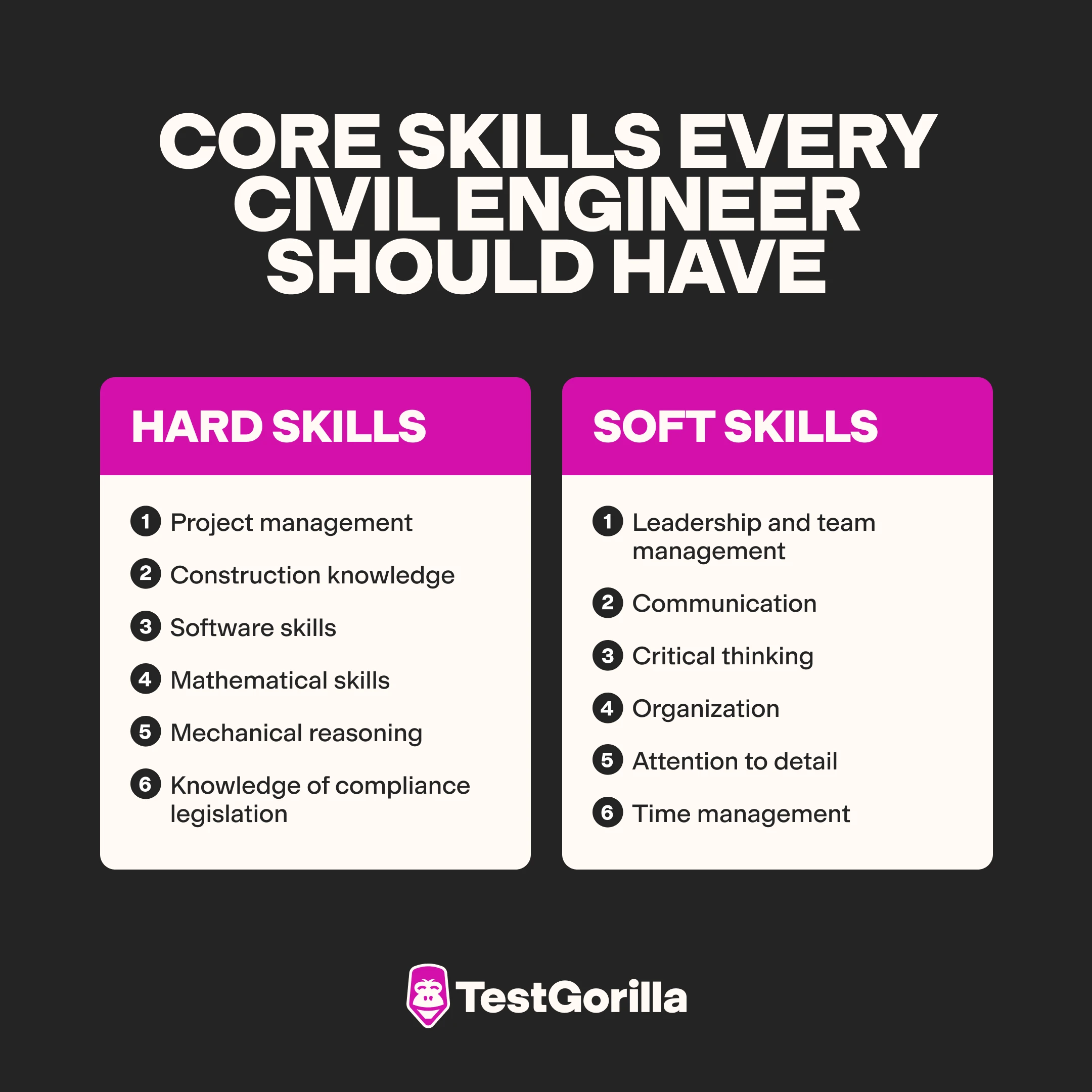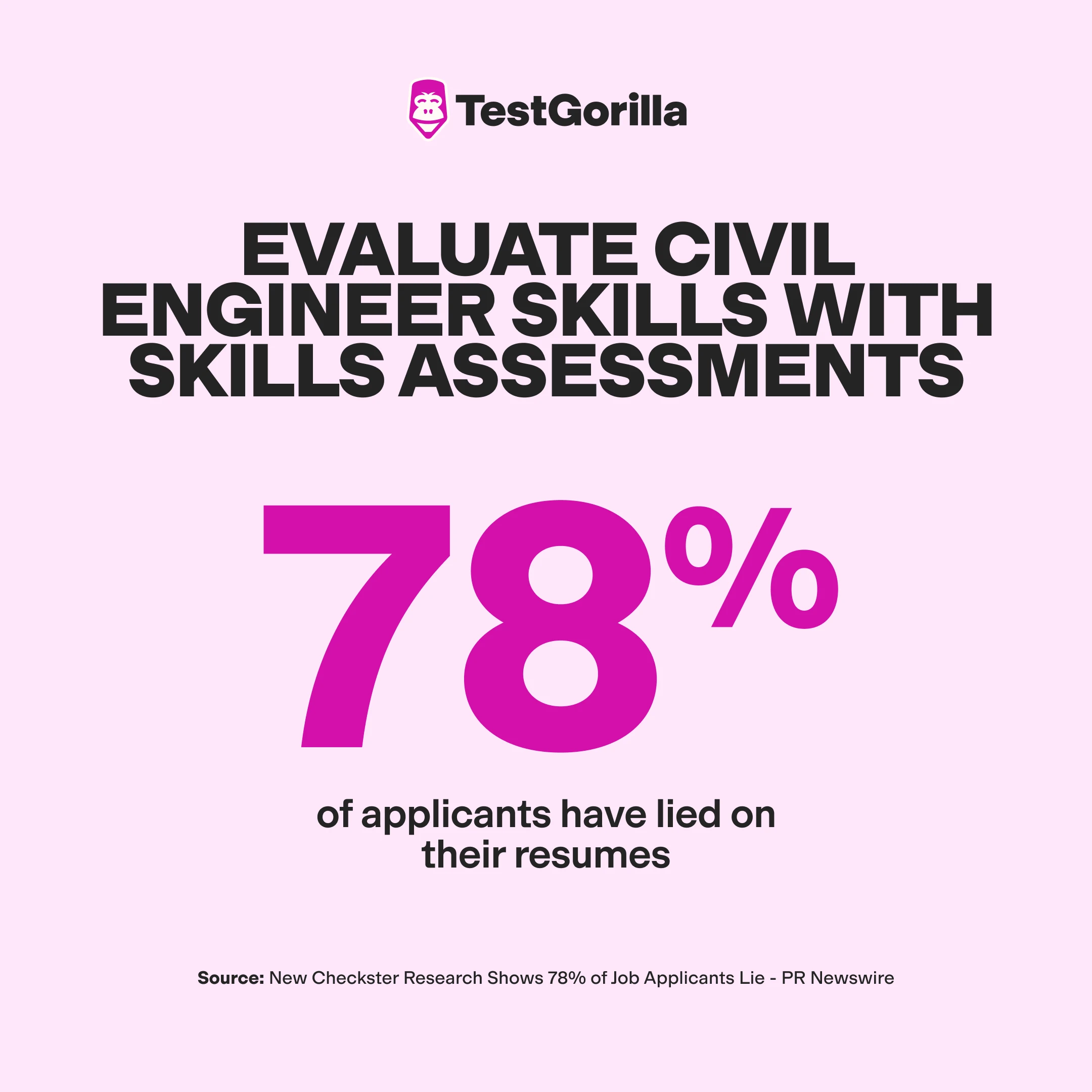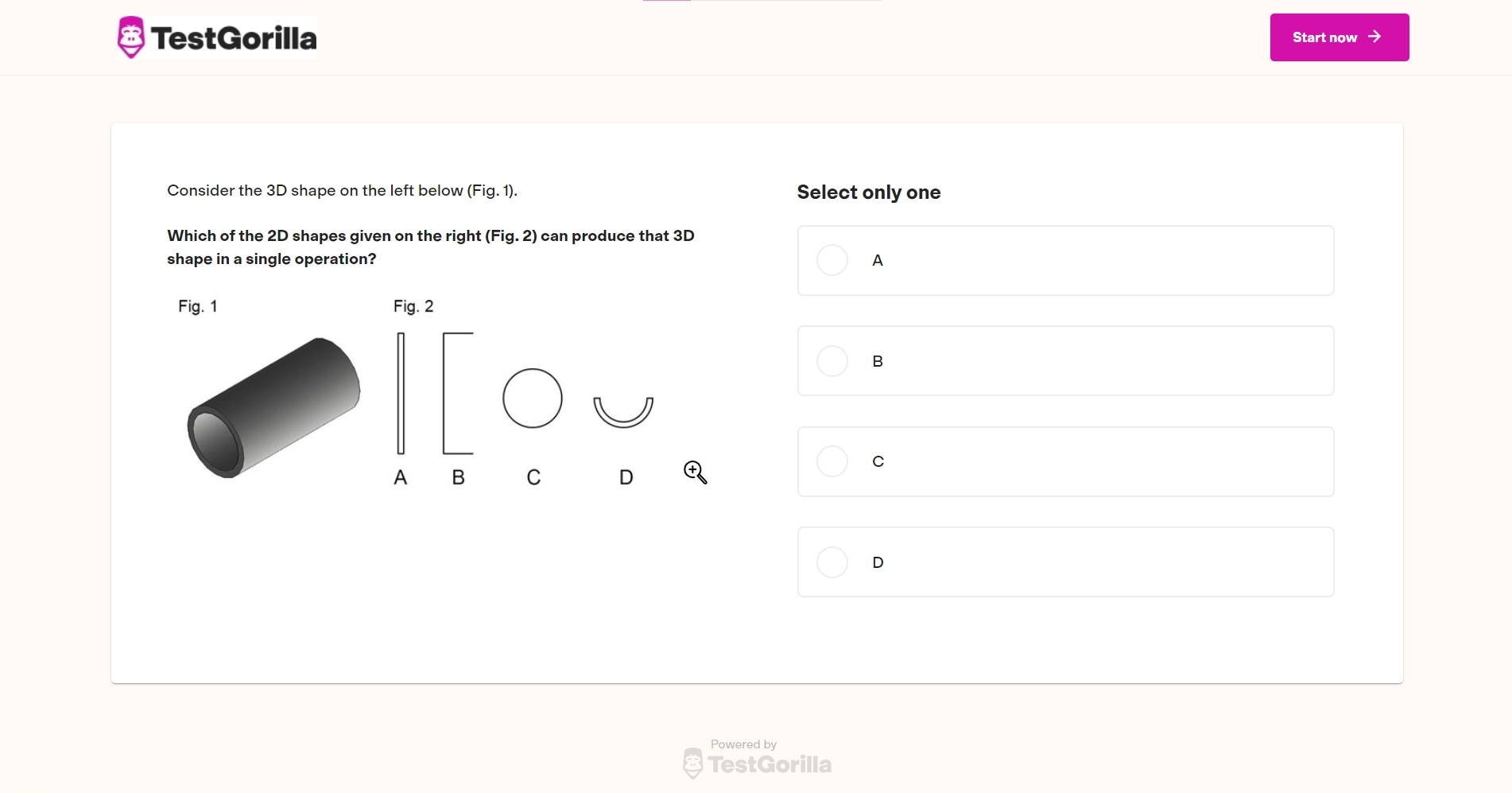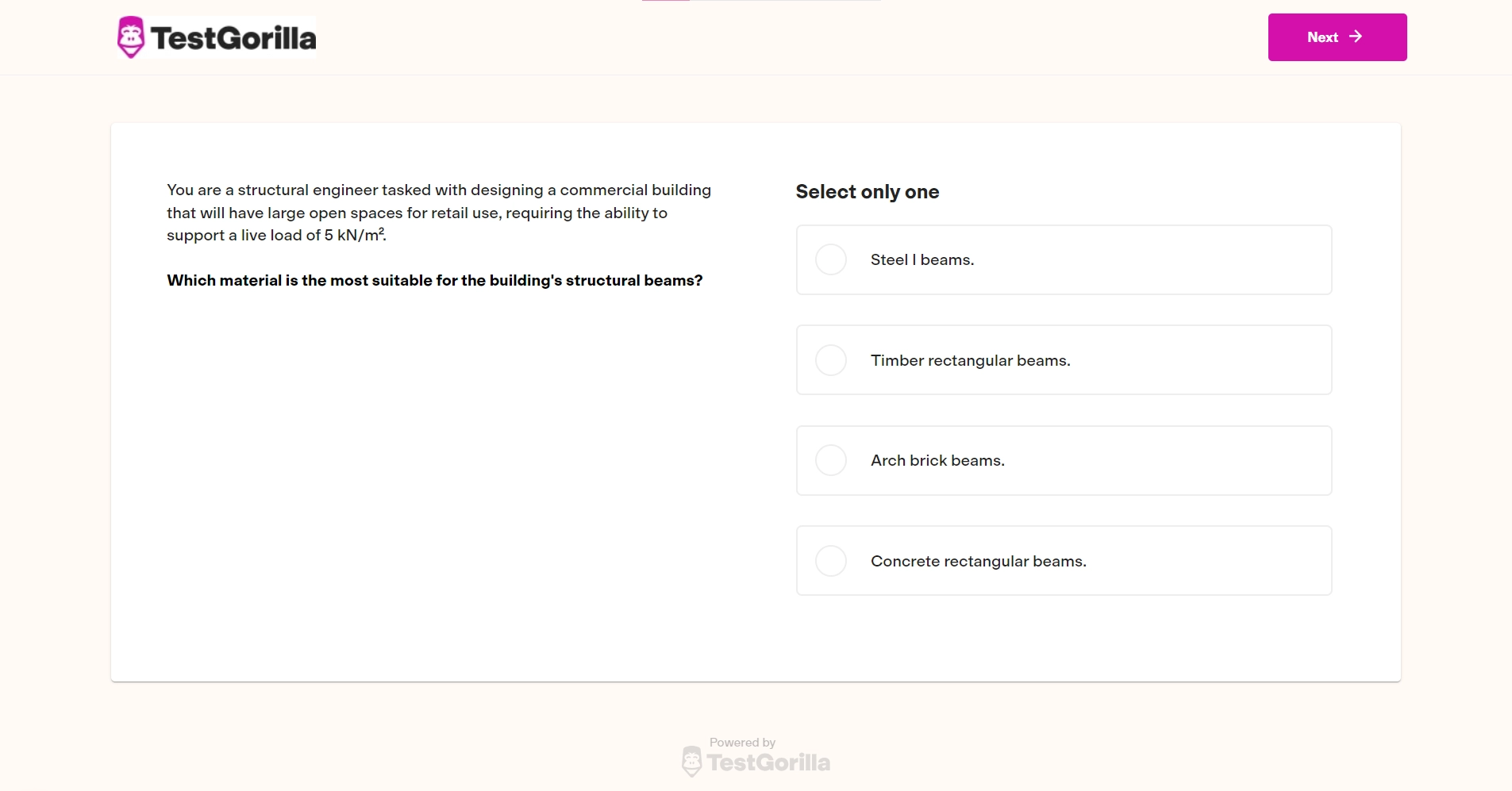Use skills-based hiring to find and hire the best civil engineers
Civil engineers are the brains behind construction work. They use skills like mechanical reasoning to design, plan, and supervise construction for the private and public sectors.
Due to how important their role is, hiring an inexperienced civil engineer results in issues like delays or insufficient oversight. To avoid mis-hires, you must know how to evaluate a candidate’s skills and expertise – ideally using talent assessments as the backbone of your recruitment process.
Below, we share helpful tips on how to hire a civil engineer successfully. We also discuss their role, key civil engineer skills, and how to draft a civil engineer job description.
What is a civil engineer?
A civil engineer is a professional who plans and maintains public and private infrastructure. Civil engineers ensure that the construction of roads, bridges, dams, airports, and buildings goes smoothly, meets legal requirements, and that the resulting structures are safe to use.
Typically, civil engineers have on-site and in-office roles that contribute to successful infrastructure construction.
On-site roles of civil engineers include managing the construction process and carrying out structure investigations. They also assess risks and the availability and cost of materials.
In-office roles of civil engineers include analyzing construction data, such as the number of materials available and the project timeline. In addition, they draft working schedules, write reports, and prepare cost estimates.
Civil engineers’ roles are also similar to that of construction managers. Both work to complete infrastructure projects but feature major differences:
Role | Description |
Civil engineers | Engineers supervise and apply their technical knowledge so that the construction process is safe, smooth, and organized. They require a bachelor’s degree in their field and don’t carry out the construction work, focusing instead on survey, design, and maintenance. |
Construction managers | Construction managers ensure they complete the project under construction, supervising teams, schedules, and on-site materials. They must have on-the-job training and a bachelor’s degree in construction management or a related field. |
Types of civil engineers and what they do
Civil engineering is a diverse field, reflecting different infrastructural needs. Here’s a breakdown of a few roles civil engineers fill:
Type of civil engineer | Description |
Construction and management | These engineers oversee projects, budgets, timelines, and regulation compliance. |
Geotechnical | Geotechnical engineers analyze and overcome risks that arise from soil, rock, and underground conditions. |
Structural | Structural engineers focus on how structures withstand loads and external forces. |
Transportation | Transportation engineering specialists work to provide convenient, accessible transportation systems (e.g., roads and railways). |
Water resources
| Engineers specializing in water resources design clean and controlled water infrastructure (e.g., irrigation and wastewater treatment systems). |
Why hire a civil engineer?
Civil engineers provide essential services to effectively carry out a building project. They help you plan, identify risks, and keep projects on track.
In addition, certain sites require a professional’s involvement. Bridge construction, for example, needs the expertise of a structural civil engineer to achieve a stable structure that withstands wind, gravity, and traffic.
Even when you don’t need a civil engineer, consulting one is beneficial. For instance, professionals offer specialized knowledge about construction, like resilient infrastructure, to fight climate change.
Experts also introduce engineering innovations, like implementing smarter technologies to support your sustainable practices or maintenance procedures.
The best insights on HR and recruitment, delivered to your inbox.
Biweekly updates. No spam. Unsubscribe any time.
12 fundamental skills needed for a civil engineer
A competent civil construction engineer demonstrates several types of skills, which you must thoroughly evaluate during the hiring process to pick the right candidate.
6 civil engineer hard skills
The hard skills of civil engineers show that they have the technical knowledge and expertise to function in their field.
Below, we describe some of the hard skills an excellent civil engineer must possess.
1. Project management
A significant part of a civil engineer’s job revolves around project management to effectively plan, organize, control resources, and achieve goals.
Civil engineers with project management skills complete their projects on time, ensuring they deliver quality without exceeding budgets. Moreover, civil engineers need good project management skills to coordinate their teams.
2. Construction knowledge
Civil engineers don’t carry out construction but need knowledge of construction materials, techniques, and processes. With adequate knowledge, they design safe, efficient, and durable structures that meet legal and stakeholder expectations.
For instance, a qualified civil engineer knows how much material a project needs. They also anticipate potential environmental engineering issues during construction and develop practical, cost-effective fixes.
3. Software skills
Competent civil engineers display a range of technical skills that are key to their workflow. For example, professionals often need to be comfortable using engineering design software like AutoCAD, Civil 3D, or Autodesk to bring their designs to life in 2D or 3D.
Specific areas of engineering also require specific software, such as SAPFire’s SAP2000, a tool to model and analyze structural models.
Since this software requires specialized knowledge, evaluating a candidate's understanding is hard if the recruiter isn’t a civil engineer.
To get around this and better assess candidates, recruiters can try out TestGorilla’s demo and use skill tests made by civil engineering experts.
4. Mathematical skills
Civil engineers must know how to effectively work with advanced mathematics to determine a structure’s stability, design, materials, and systems.
For example, while surveying a structure, civil engineers consider acting forces, like the load the structure is supposed to carry (load capacity), or environmental factors like wind.
Civil engineers calculate stability by comparing these forces with the structure’s capacity. In their calculations, they apply numerical reasoning to assess risks and solve the problem.
5. Mechanical reasoning
Like mechanical engineering, mechanical reasoning is often integral to a civil engineer’s work. It sheds light on how principles of mechanics and physical elements like force or movement affect a structure.
For example, a civil engineer assesses how forces from a dam’s systems (e.g., turbines, pumps, and engines) impact its structural design. Professionals use their insights to make design adjustments to accommodate specific forces and ensure structural integrity.
To determine how a candidate approaches similar problems, recruiters use the Mechanical Reasoning test to evaluate real-world engineering tasks.
6. Knowledge of compliance legislation
Civil engineers must know and adhere to laws, regulations, standards, and guidelines governing construction projects. For example, American engineers must stay current on regulations like the International Building Code (IBC).
There are a lot of regulatory materials to comply with, but for projects to succeed, engineers must follow legislative changes and communicate policies to authorities, contractors, and stakeholders.
Hire the best civil engineers today
Talent assessments help you accurately evaluate hard skills like mechanical reasoning and software expertise. To learn more, try out TestGorilla for yourself.
6 civil engineer soft skills
From managing teams to communicating with clients and stakeholders, civil engineers need soft skills for projects to progress smoothly. Strong candidates have the following:
1. Leadership and team management
Civil engineers often oversee an on or off-site team and collaborate with professionals from other fields, like architects and mechanical engineers. Hence, they need leadership skills to coordinate and achieve goals.
Furthermore, with good leadership skills, a civil engineer gains insights from their team to make more informed decisions – aiding planning, construction, and infrastructure maintenance.
The Leadership and People Management test helps you identify candidates who know how to take charge and motivate others to screen for an engineer’s ability to lead objectively.
2. Communication
A critical part of a civil engineer’s job involves interacting with others on the construction site and in the office.
As a result, civil engineers must be able to share ideas and break down technical information to clients, coworkers, and stakeholders. In addition, these communication skills help civil engineers explain concepts, assign tasks, and ensure everyone works toward the same goal.
3. Critical thinking
Through critical thinking skills, civil engineers analyze and interpret data, which then enables them to identify patterns, trends, and potential issues with the construction process.
Civil engineers also need critical thinking skills to develop innovative products. They need to have a creative mindset and think outside the box to find new approaches to project design and execution.
4. Organization
Civil engineering projects are often complex and involve numerous tasks, requiring civil engineers to be organized and manage projects effectively.
For example, they must be able to assess priority and keep track of many documents, including design plans and project reports. Strong organization skills ensure they don’t mix up documents and risk managerial errors.
5. Attention to detail
Recruiters use assessments like the Attention to Detail test to gauge how candidates notice visual details and information. Civil engineers must have an eye for detail to spot errors in construction. Without this soft skill, they risk developing unsafe infrastructure.
Furthermore, keen attention to detail ensures civil engineers and their teams complete projects on schedule. If they spot risks early, the team avoids wasting time rectifying issues.
6. Time management
An excellent civil engineer knows how to allot the appropriate time to projects according to their urgency or priority level. Effective time management skills enable civil engineers to handle various tasks with available resources and meet their deadlines.
Professionals also consider potential drawbacks and plan for them – guaranteeing completion, even in the face of unexpected challenges.
4 steps on how to hire a civil engineer
The following steps give you pointers on how to hire civil engineers, including tools to assess talent comprehensively.
1. Write a job description
A job posting template is an excellent way to attract the best candidates to apply for your open position.
Below, we have crafted a civil engineer job description to help you get started:
Job title
Full-time civil engineers needed at [COMPANY NAME]
Company overview
[COMPANY NAME] is a construction company located in [LOCATION]. Our primary focus is to develop infrastructure that satisfies our community and meets legal requirements.
[COMPANY NAME] is looking for civil engineers with a keen eye for detail who provide quality services to the company and our community.
Duties and responsibilities
As a full-time civil engineer at [COMPANY NAME], you must:
Develop and design plans for civil engineering projects, such as [EXAMPLE PROJECTS]
Perform site investigations and surveys to determine project feasibility and identify potential issues
Prepare project cost estimates and construction schedules
Supervise the construction and installation of project components and ensure that work is completed to specifications and quality standards
Review and analyze project data to ensure compliance with local, state, and federal regulations
Collaborate with other engineers, architects, and contractors to ensure meeting project objectives
Provide technical expertise and support to project team members
Manage project budgets and prepare progress reports for clients and stakeholders
Keep up-to-date with the latest developments in civil engineering technology and industry standards
Skills and qualifications
For this position, you must have:
Strong knowledge of civil engineering principles and practices
Excellent communication, project management, and problem-solving skills
Professional Engineering (PE) license or PMP certification preferred
Ability to work independently and in a team environment
Knowledge of local, state, and federal regulations related to civil engineering projects
A bachelor’s degree in Civil Engineering or any related field
Proven experience in civil engineering
2. Use the right platforms to find civil engineers
The next step is to narrow down where to hire a civil engineer. First, decide which type of civil engineer you want to hire: a freelancer or a full-time professional.
Freelance civil engineers work as engineering consultants over a stipulated period and don’t require benefits such as health or dental insurance. They typically also work remotely and tailor their schedules according to their terms, choosing assignments and charging you per project.
As freelancers function independently on a project-by-project basis, you gain specialized help with civil engineering services when needed rather than hiring a full-time employee.
Freelance civil engineers are available to hire on platforms such as:
Fiverr
Upwork
Guru
Kolabtree
Freelancer
Next, full-time civil engineers – also known as in-house civil engineers – work with your company for a long period. They are usually part of a team of other engineers, architects, project managers, and support staff.
The main advantage of a full-time civil engineer is consistent oversight in every project. Full-time civil engineers also have access to company resources such as software, tools, and equipment – enabling them to work within your unique procedures.
To hire full-time civil engineers, use referrals or job boards such as:
Indeed
Glassdoor
LinkedIn
ZipRecruiter
3. Evaluate civil engineer skills with skills assessments
Relying on candidates’ resumes isn’t the best course of action. Harver (formerly called Checkster) reports that around 78% of applicants have lied on their resumes.
To be sure your candidates have the civil engineer skills you need, recruiters use skills tests to screen for them.
Pre-employment skills testing provides an equal opportunity for all candidates to prove their talents and suitability for the role, regardless of their background. It also targets industry-specific knowledge you can’t easily gauge from a resume.
For example, the AutoCAD test evaluates a candidate’s familiarity with the software and its concepts with questions like the one below.
With TestGorilla, you’re free to create your civil engineering talent assessment by combining more than one test on our platform. Here’s an example of five tests recruiters customize for an objective evaluation:
Leadership and People Management test: This test is a comprehensive assessment of candidates’ ability to lead others. Civil engineers oversee projects and work in cross-functional teams, making it essential to determine how professionals coordinate toward achieving a stipulated goal.
Communication test: Recruiters assess candidates’ ability to communicate verbally and in writing effectively. Civil engineering is a collaborative role; candidates must convey ideas clearly, listen actively, and respond appropriately.
Attention to Detail test: Civil engineers have to spot and correct issues in construction. Our test assesses various skills, including visual perception, accuracy, and precision. It uses practical questions to identify patterns and match data.
Numerical Reasoning test: Using this assessment helps you identify civil engineers who carry out and interpret mathematical calculations comfortably. Candidates who pass the test have a firm grasp of numerical information and apply the results of calculations to their work.
Mechanical Reasoning test: This test measures a civil engineer’s knowledge of mechanical concepts and principles necessary to their job. It includes questions related to force, gravity, and motion, which all affect structural design.
In addition, assessments like our Structural Engineering test enable you to hone in on the specialized areas of civil engineering. We suggest including two hard skill tests, like this one or the AutoCAD test, in your assessment.
A Free forever plan is the best way to get started. Our test library contains numerous tests, all vetted and constructed by subject-matter experts.
4. Plan your interview questions
To objectively evaluate each candidate, carefully plan your interview questions early on. It’s also good practice to conduct structured interviews where you ask questions in the same order. Doing so ensures you end up with comparable data at the end of the day.
Here are a few questions to consider:
What inspired you to become a civil engineer?
What are the most important qualities for a civil engineer to possess?
How would you approach a project that’s gone over budget or is behind schedule?
How do you stay up-to-date on the latest technologies and advancements in civil engineering?
Once the applicant clears the interview, they are ready for onboarding.
How much does it cost to hire a civil engineer?
The cost of a civil engineer depends on several factors, such as level of experience, geographic location, the complexity of the work involved, and whether you need full-time or freelance services.
On average, the yearly civil engineer salary is $82,674, according to 2024 data from ZipRecruiter. However, engineers with greater expertise often cost more. You also have to consider how financially or logistically expensive current recruitment methods are.
For example, Solid Solutions Management previously assessed engineering hires through quizzes and as a group effort, which was subjective and laborious. With TestGorilla’s help, they switched to a more adaptable way of testing candidates.
Using science-backed talent assessments, recruitment teams identified critical soft skills and compared data against opinions formed in interviews – achieving a more unbiased, comprehensive, and straightforward recruitment process.
Furthermore, switching to skills-based hiring helps you automate evaluations and measure civil engineering candidates at scale. To visualize the time and money savings of skills-based hiring, check out the recruitment ROI calculator.
Find top civil engineers more cost-effectively
Skill tests streamline the recruitment process, enabling you to accurately and fairly assess civil engineering candidates without wasting time and money.
Hire the best civil engineers with TestGorilla
Knowing how to hire a civil engineer is the first step to finding talent for your organization. The next step is evaluating professionals’ engineering skills effectively.
Build your own assessments and identify talent so you don’t suffer costly mis-hires or waste valuable resources.
Check out the TestGorilla demo and discover how to combine multiple civil engineer skills assessments to evaluate candidates quickly and objectively.
When you’re ready to try it out for yourself, sign up for our Free forever plan and get started immediately.
How to hire a civil engineer FAQs
Have more questions on how to hire civil engineers? We’ve got you covered.
How do I hire the right engineer?
Not all engineers fulfill the same roles, so hiring managers need to consider their budget and project needs. Understanding whether a freelance or full-time engineer is best helps them narrow down where and how to find a civil engineer. Screening with customizable talent assessments enables civil engineering companies to evaluate any potential candidates, as well as narrow down high-quality engineers quickly.
What qualities should a civil engineer have?
A good civil engineer must be communicative, collaborative, organized, and knowledgeable of their industry and industry-specific tools. Furthermore, qualified professionals must have strong software, mathematical, and mechanical reasoning skills. Competent engineers are also comfortable catching errors and implementing fixes that require critical thinking and strong leadership.
What personality are most engineers?
Most engineers display inquisitive and logical personalities. They’re eager to learn and solve technical problems. Consequently, engineers often align with ISTP, ISTJ, or INTJ qualities of the MBTI personality types. Identifying these qualities and using personality tests sheds light on the strengths, drive, and behaviors of candidate engineers.
You've scrolled this far
Why not try TestGorilla for free, and see what happens when you put skills first.

























